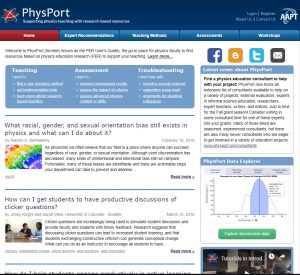 While tracking down some resources for active learning this past week, I stumbled on PhysPort, and wished I’d know about this site much sooner. PhysPort, formerly the Physics Education Research (PER) User’s Guide, supports “…physics faculty in implementing research-based teaching practices in their classrooms, by providing expert recommendations about teaching methods, assessment, and results from physics education research (PER). Work in PER has made enormous advances in developing a variety of tools that dramatically improve student learning of physics. Our goal is to synthesize and translate the results of this research so you can use it in your classroom today.” The thing is, many of the resources here will be valuable to faculty in any discipline and will help improve student learning in any course.
While tracking down some resources for active learning this past week, I stumbled on PhysPort, and wished I’d know about this site much sooner. PhysPort, formerly the Physics Education Research (PER) User’s Guide, supports “…physics faculty in implementing research-based teaching practices in their classrooms, by providing expert recommendations about teaching methods, assessment, and results from physics education research (PER). Work in PER has made enormous advances in developing a variety of tools that dramatically improve student learning of physics. Our goal is to synthesize and translate the results of this research so you can use it in your classroom today.” The thing is, many of the resources here will be valuable to faculty in any discipline and will help improve student learning in any course.
Certainly, some of the materials and examples are physics-specific; others may be more useful for STEM faculty generally. Yet, there is plenty here that will be appreciated by anyone looking for pedagogical resources, even Humanities faculty. The best thing is the emphasis on research-based strategies.
I liked the clean, clear structure of the site. There are five tabs at the top each page for easy navigation to the Home page, Expert Recommendations, Teaching Methods, Assessments, and Workshops.
On the Home page there are three areas for general help—Teaching (I want to…), Assessment (I want to…), and Troubleshooting (I need help with…). Clicking on a topic of interest will take you to a page with relevant materials and resources. Expert Recommendations are essentially articles/blog posts written by PhysPort staff and guest authors to help instructors. I’ve listed some articles of general interest further down.
Teaching Methods will take you to a form where you can enter information more specific to your course. You can enter subject from a drop down list (including “any subject” to keep results more generic), level, setting, student skills you’d like to develop, the amount of instructor effort required. You can choose the level of research validation, and exclude resources, such as computers for students or tables for group work, that may not be available to you. Below the form is the list of 57 Research-Based Methods that you can browse through if the form doesn’t provide you with relevant choices. Again, some of these are physics-specific, but others, like Just-in-Time-Teaching are broadly applicable. Each of the methods has tabs for Overview, Resources, Teaching Materials, and Research.
The Assessments tab allows you to explore “…where you can get instant analysis of your students’ scores on research-based assessment instruments, comparisons to national averages and students like yours, recommendations for improving your teaching, and reports for tenure and promotion files, teaching portfolios, and departmental accreditation.” It is also set up with a form at the top. You can scroll down to see a list of 92 Research-Based Assessments. Most of these are physics-based. But scroll to the bottom of the page for a few interactive teaching protocols that may be more generally appropriate.
The Workshops tab features video tutorials. Again, there is a mix of physics-specific and non-specific materials.
Back to my original quest for resources on active learning. Under Expert Recommendations tab of particular interest are a series of posts by Stephanie Chasteen, University of Colorado Boulder (June 20, 2017) on implementing active learning strategies in your classroom. These are applicable to any subject matter, not just physics or even STEM courses. Each topic covered has a section on further reading with a list of references, a general reading list, and suggested keywords for searching in the literature.
- How do I help students engage productively in active learning classrooms?
- How can I set clear expectations in active learning classes, so students see the value of engaging?
- How can I help students become more expert learners, so they engage in active learning?
- How can I help students feel intrinsically and extrinsically motivated to engage in active learning?
- How can I create community in an active classroom, so that students feel encouraged to engage?
- How can I assess the level of student engagement in my class?
- How can I set the stage for student engagement in an active learning classroom, from the first day?
- What can I do if students don’t speak up in discussions with peers, or with the whole class?
- What if I get low student evaluations, or hear complaints about active learning?
PhysPort is a rich resource for all faculty. Spend a little time digging around. You should come up with some great material.
Macie Hall, Senior Instructional Designer
Center for Educational Resources
Image Source: Screenshot of PhysPort home page: https://www.physport.or
